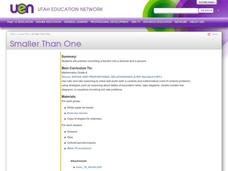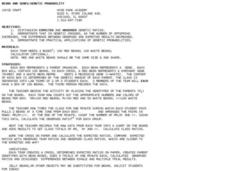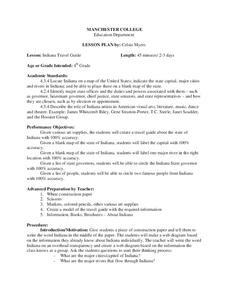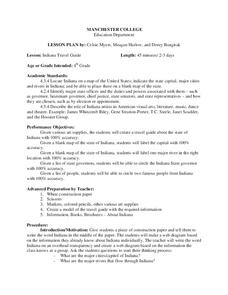Curated OER
Teaching Radioactive Decay: Radioactive Half-life And Dating Techniques
Students generate a radioactive decay table for an imaginary element using a box filled with pinto beans and M&M's. They use their data to plot a decay graph, develop the concept of half-life, and use the graph to "age" several samples.
Curated OER
Write Me Two Ways
Fifth graders write numbers in standard and expanded form. In this writing numbers in standard and expanded form lesson, 5th graders write integers up to billions in word form and standard form. Students use number cards to create...
Curated OER
"Let's Write a Song"
Fourth graders analyze, brainstorm and practice playing a melody/pattern with rhythm, tempo, dynamics, and instrumental pieces of many styles. In addition, they create an original piece of music.
Curated OER
Changing State
Young scholars examine the changing states of water. For this solid, liquid, gas lesson, students discover that water changes when heated or cooled. Young scholars make predictions and then use the interactive whiteboard to "heat and...
Curated OER
Simple Machines
Fourth graders examine a machine and how its parts work together. In this simple machines lesson, 4th graders work in groups to study different gadgets, analyze how the parts of the gadget work and draw sketches of the gadget. Students...
Curated OER
Government
Second graders run for various offices. They dress up like a politician, pretend to be running for an office, and tell the students why they should vote for him/her. They explain why it is necessary for a community to have a government
Curated OER
Smaller Than One
Sixth graders practice converting a fraction into a decimal and a percent. They explain relationships among rational numbers. They order and compare whole numbers, fractions (including mixed numbers), and decimals using a variety of...
Curated OER
Sweat Your Socks Off
Fourth graders explore evaporation by conducting an experiment. In this water properties lesson, 4th graders examine the differences between two socks that get wet, one which is placed in front of a fan. Students discuss why the sock...
Curated OER
Immigration Unit
Third graders develop an appreciate for the various cultures that are present in their local community. Through reading and research, they explain how various culture came to live in their area. At the conclusion of the unit, 3rd...
Curated OER
How Hot Is Hot In Namib?
Students research and demonstrate the temperatures of the Namibian Desert. They watch and discuss a video, conduct an experiment to demonstrate the desert temperatures, record their results in the form of a graph, and compare/contrast...
Curated OER
Place Value Charts to the Millions Place
In this math learning exercise, students learn to read, write, order and compare numbers and place them on a place value chart. Students begin the 4 pages of exercises by studying a sample place value chart. Students then fill out 3...
Curated OER
Beans and Genes/Genetic Probability
Students use 2 sets of colored beans to represent the genes of an organism. In this genetic probability lesson plan, students use the colored beans to represent the genotypes of offspring which they pull out of a box at random while the...
Curated OER
Percentages: Fractions and Decimals
Second graders convert fractions to percentages. In this interactive whiteboard percentages lesson, 2nd graders problem solve using percentages, fractions, and decimals.
Curated OER
Discovering Math Rational Number Concepts
Young scholars research Egyptian hieroglyphics using print and Web resources. THey discuss Egyptian achievements in mathematics. Students explore how Egyptians used hieroglyphics to write numerals. They multiply and divide numbers...
Curated OER
Different Minerals
In this minerals worksheet, students read about the relationship between elements, rocks and minerals. They experiment using 6 different colored gumdrops to represent 6 common elements. Students construct gumdrop and toothpick models of...
Curated OER
Constructing a Phylogenetic Tree Using DNA Sequence Data
Students analyze DNA sequence differences between organisms in order to establish a reasonable picture of the evolutionary relationships between them. They take the role of molecular biologists and make genetic changes and constructing...
Curated OER
Indiana Travel Guide
Fourth graders, after exploring and researching the state of Indiana, create a travel guide about the state of Indiana including its capital, major rivers, governors and two famous people from the state. They utilize a variety of art...
Curated OER
Arthropod Coloring
In this arthropod worksheet, students compare and contrast the different animals found in the Phylum Arthropoda: insects, arachnids, and crustaceans. Students complete 8 fill in the blank statements and color illustrations.
Curated OER
A Piece of Pi
In this piece of Pi instructional activity, students examine pi. They count how many times a given digit appears in the list of digits. Students describe their observations and conclusions regarding pi. This one-page instructional...
Curated OER
Indiana Travel Guide
Fourth graders share their information about their home state. In this research lesson plan, 4th graders use graphic organizers to make a travel guide about the state of Indiana. This lesson plan could be modified for use with any state,...
Curated OER
A Remainder of One: A Math-Manipulative Lesson
Young scholars listen to the reading of the book "A Remainder of One" and use math manipulatives to recreat "bug squadrons".
Curated OER
Rotational Inertia
Students spin themselves to understand rotational inertia. In this Inertia lesson, students will also use ramps, balance beam and pendelum to conduct rotational inertia experiments. Students draw conclusions to explain rotational...
Curated OER
Cattle Drive
Students explore cattle drives. In this United States history and letter writing lesson, students write a letter to their family predicting possible problems that were encountered by participants in cattle drives. Students design brands,...
Curated OER
Exploring a Galaxy
In this galaxy worksheet, students use the Internet or other resources to answer 13 questions about the galaxy NGC-1232. They are given a photograph of the galaxy to help determine the width and diameter of certain regions of the galaxy.

























